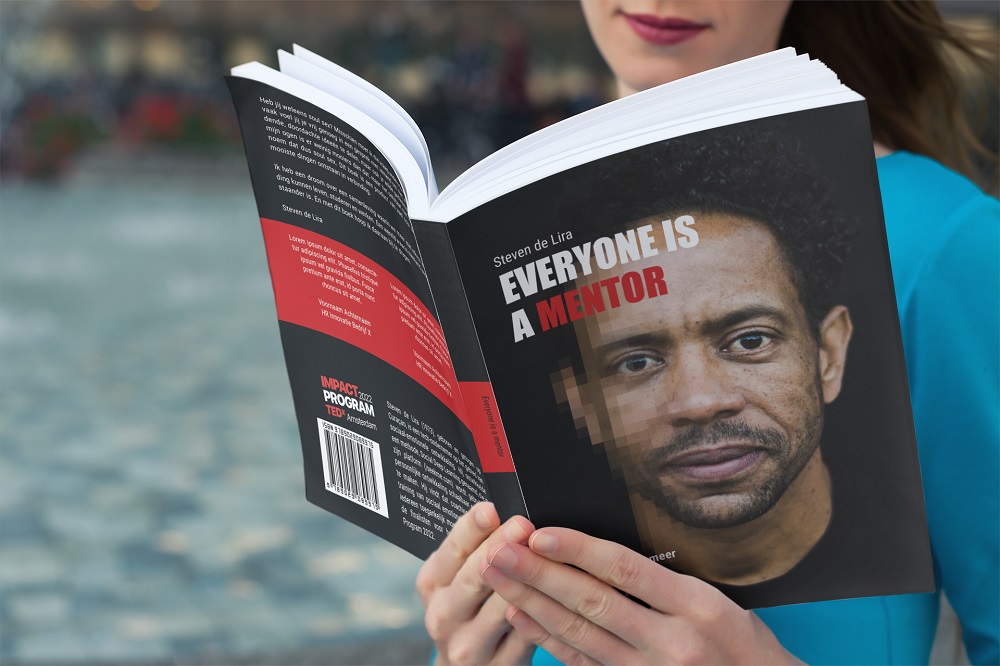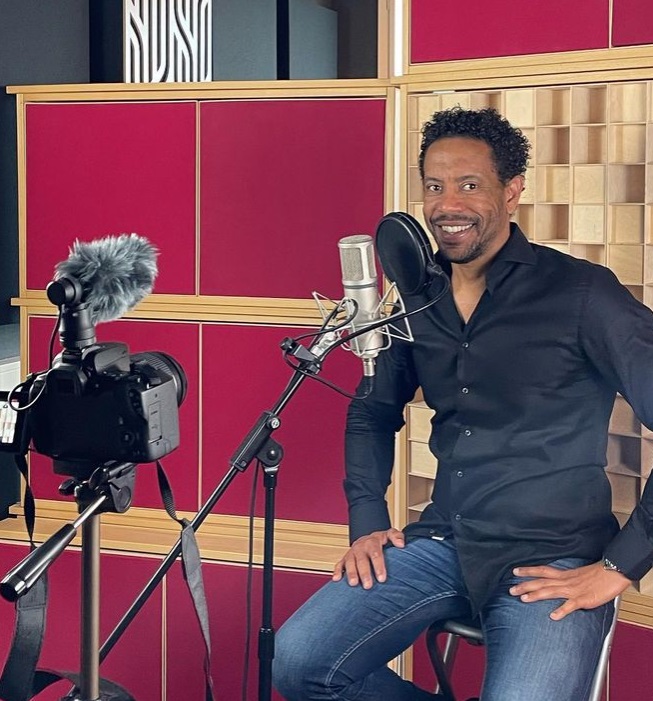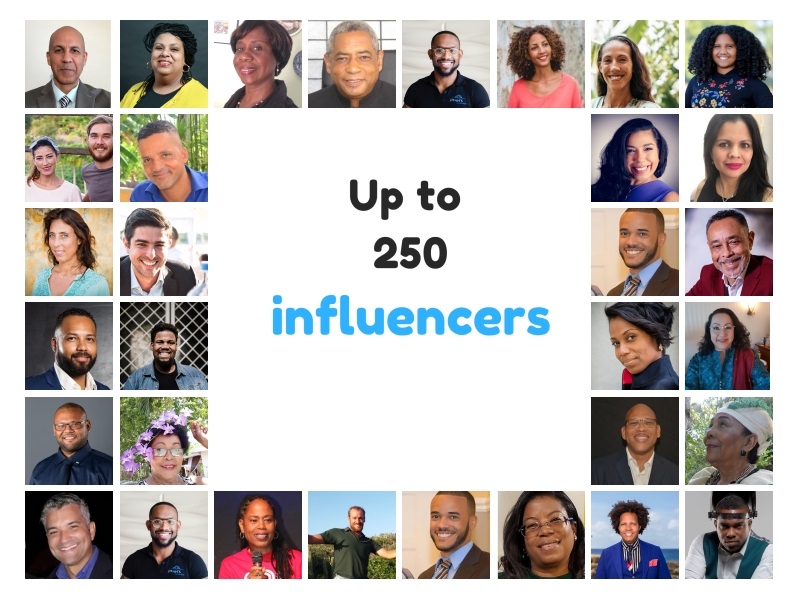Influencer Steven de Lira
Interview April 2023

Could you share with us some information about your family life?
I was raised in a warm, loving and safe environment and I feel very fortunate to have experienced this. I am the second child in a family of three children, the liaison among the siblings. Later on as I grew up, I realized that not everyone have experienced this. I was allowed to experiment, to discover new things and take my own initiatives. My parents didn’t project their fears nor dreams on me. I consider this to be one of the most beautiful presents that parents can give their children, as this has helped creating my the mindset that I have up to this moment. I was born in Curaçao in 1973 and went to Holland to study when I was 20 years old.
I was married and later divorced from the love of my life and we have 2 children, a son and a girl, whom both of us raise in a loving and considerate way. When needed, we jointly take decisions regarding the education of our children. My daughter of 16 years old with whom I have a special “father-daughter” relationship, is now at the secondary school in Curaçao in the 4th grade of the HAVO for one year, as she was so curious of getting to know more of Curaçao where she has her roots.
And? How is she experiencing Curaçao?
She loves it, although she is experiencing the lack of independ mobility in Curaçao as a big challenge, compared to living in Holland. Almost anywhere she wants to go, she needs transportation.
Could you share something about your educational background and your experience?
I studied and graduated as an engineer in Industrial Engineering & Management. This is a study that is neither Technical nor Management, you get a touch of different subject matters, but you don’t become a specialist in anything. But it was foundational for what I do at this moment.
I have worked for 4 years in the Telecom sector when it was booming, but then in 2002 the Telecom sector crashed and I was out of work and ended up become an Operational Manager of a Social Workplace.
I always tell people that I grew up in an emotional country (Curaçao); studied in Holland and became a rational thinking grown up man. I have experienced both ends of the spectrum, going to the extremes at both ends of this spectrum. On one of the two axis, I was working in an extreme commercial environment during my years in the Telecom sector, in the other axis I needed to focus extremely on the humanity of those I worked with and worked for in a Social Workplace. This has defined my personality, as I can navigate between both extremes and I can be continuously be a connector of these extremes.
In 2005, I started on my own and driven by this BIG Life Question that has fascinates and drives me for 17 years now.
The question is: “Why do 75 % of reorganizations, changemanagement interventions fail? Or why do only 25 % of these interventions succeed”. That number is so bizar. Imagine yourself that 75 % of the zoom meetings we want to have would fail or 75 % of the roomtops we live and work under, would fall down. This I have made my lifework. There is so much that has been written about change management before me and probably still now.
Has this become your life work nowadays?
Yes, it has. I have written a book on it.
What is the explanation for this phenomena, according to you?
There are two reasons. First of all, most people that want to achieve something are driven people. They have a strong intrinsic motivation. But 90 % of most people don’t have this. 90 % wake up in the morning, do their things, because they get paid for doing this or because their boss is highly motivated. The point being is they don’t buy into this or don’t feel it, this will not be sustainable.
Secondly, most managers that are driven don’t see or understand this, they don’t see that people want security most of all. If they commit it is via the head not from the heart. Managers tell them to focus, they don’t tell them how to find their own focus.
I have this book I am reading of Ben Tiggelaar, De Ladder, waarom veranderen zo moeilijk is en welke stappen wel werken, he explains the concept of a ‘ladder‘. The lower ‘ladder’ is support; the middle ‘ladder’ is behavior, and the top ‘ladder’ is goal. What he suggests is, starting from the top ‘ladder‘, the goal. Why do most people or most students don’t have their own goals? If they have one, it usually based on fear or based on dreams of others.
As a trainer coach, I have worked with CEOs and Management team members at different financial institutions and banks, coaching them and teaching them strategies. So I have been there and done that. I am advocating something different than most coaches and trainers do. So I believe I have found the answer, based on my own experiences. Start from the bottom instead of the top of the ladder. Once started, help a greater number of people to create a divers network of mentors. Secondly, stimulate deeper conversations.
Thirdly, people will develop numerous versions of their heart’s desires or goals or ambitions to help people manage these versions. The challenge I love is: “How can we help thousands or even better, millions of people find and connect to their purpose”.
We know you to be involved in social-emotional learning using modern technology, all aimed to help change mindsets. How did you get involved?
I have been doing my training and coaching live. But I have come to realize, that I work for people that are privileged and earn very well, as they are the ones able to have access to and pay professionals like me coaches, mentors etc…
There is more time needed to allow people to develop their own vision. If we would work at the Fire Department as client and where we would have 2000 employees, we would lack the time and it would cost tons of money to pay us. My point of view is that the usual coaching is too expensive. So in my explorations, I have asked myself how to support a greater number of people that are on their own personal journey to find their purpose in life.
Now the management has access to coaches and mentors and develops a vision and tell their employees which way to go and go that way as fast as possible, to realize after a while that people don’t run so hard as they ran in the beginning. Is that so strange? I believe the question should be asked, what do you want, for whom, and with whom do you want to be associated? This requires social-emotional development. We as human beings are socially creating species.
How did you end up working as an operational manager at the Social Workplace?
The best coincidence that ever happened to me. After the crash of the Telecom sector I was out of work. I applied via a newspaper add and they accepted me, although that was not the most logical step. I would be better off working for one of the BIG 5 consultancy companies, but becoming an Operational Manager was something that fitted me perfectly at that moment in time. It was a big learning experience for me as it formed me to whom I am at this moment in time as I met excellent mentors while working there. I met passionate civil servants one of them is Peter. I once asked him why are you still working here because he could make so much money elsewhere or if he started his own company. And his answer impacted me deeply. He answered: “Because I love this job”.
This opened my eyes to the concept that people can really love the work that they were doing. This complements my skills and knowledge sets as I combined Human resources management, strategy, and Data. And I am a very pragmatic person. This toolkit was helpful for me in different other foundations that I got involved with later on.
I see a major challenge in our society. We don’t have ways and means to discern people that are able to open other people their minds and outlooks. For our children for example, we are unable to, in an objective manner, discern how open their mind is. How open are they to working with people from different cultural backgrounds? Look at the so-called ‘Toeslagenaffaire’ of the Tax department in Holland. There is no narrative, and no language available to make it easier to discern this type of competency. When you have a language, it becomes easier to manage and steer the engagement risks. We don’t have a clue if students have open minds or not. As long as we don’t have a language, whatever we do is marginal. Objectivity is important. Indeed, we have developed an objective language to discern between those who have open minds or not.
As a metaphor, do you know what the difference is between a bottle of wine that costs € 6,- and one costing € 120,-? The one costing € 120,- has a different acidity and aftertaste, it depends on where it comes from and the type of grapes and that is why wine lovers are willing to pay more for the more expensive one. And this, while taste is something completely subjective, we have developed – metaphorically speaking – an objective language to talk about the difference between a wine of 6 Euro and 120 Euro thus the ability via this language, to discern open mindedness among students.
Furthermore, if we want a better society then we would have to help also those that can’t afford to pay for the services coaches offer. That is why we need to scale up.
Look how important reading and writing have been in the past. There was a time when this was also only for a privileged group. Because reading and writing became available for almost everyone, society has experienced enormous growth in prosperity. If we want to improve our overall well-being in society, we need to offer social-emotional competency to everyone, just like writing and reading have impacted our societies.
What is your BIG WHY or driving motivation to be who you are right now?
My parents have not only raised their own biological children, but they have also raised 30 to 40 more children from lesser social backgrounds that were and are not their biological children. They are still up to this day helping to raise some children, helping them where possible. This has taught me that if you are privileged, it becomes your duty to help those who are less fortunate. It is in my DNA to help the less privileged. Because of my upbringing being loved and cared for by my parents, I have come to appreciate even more, how much peace of mind this has brought me. And my networks have helped me in a big way. So many people have helped me. So it has become to me an obligation to help and serve.
Furthermore, I tend to become super enthusiastic when I can’t do something. This triggers me to try it until I have mastered it. I adore innovation, since I was a child I loved to explore and discover. I am an innovator in technology and in a societal sense, as I also always loved technology.
As an entrepreneur, I wanted to become very rich early on. I had this sound drive to prove myself.
I wanted to have expensive cars and wear brand clothes and I wanted to end up high on the social ladder. I was fortunate to early on work in a sector, the Telecom sector, that paid me very well. But, then we divorced when I was in my early thirties and this made me realize that money doesn’t make you happy.
We have noticed in specific focus on our youth. Why do you this focus on this specific group?
Because the youth and children are fun to be around. My first book I published in 2012 and reached 3000 children in Curaçao. A local bank RBC was sponsoring a yearly cleaning up of a specific area in Curaçao. And after it was cleaned up, the same people made it back dirty. Around that year, I saw a documentary on Venezuela where they showed that parents from rival bands were getting around relatively well. The reason was that they met when their children were practicing and offering concerts together. The children were the catalysts to let the parents get along much better. So it made me realize that children have a big influence on their parents.
Children are still full of dreams and longing to achieve something in their lives, whilst adults around their 30-ties don’t have any dreams. That is why we need to keep inspiring children and feeding them to live up to their dreams. Let them cherish their dreams on a deeper level.
For example, if a child is a good baseball player, tap into the fact that they have multiple intelligences. If the child is socially intelligent and keeps the team together with his ability, he could become a good caretaker as a health worker. Or if he is creative, he might become a valuable professional in the advertising world. Or if he sees details that others don’t see, he might be a good professional in Finance.
If he is physically strong, he would waste his talents having an office job, he might become a good dancer of an athlete. We need to help children to grasp this so that they can stay true to their deeper levels of intelligence and translate their talents into other contexts outside the world of baseball. This is true for all children, this is what I mean with helping them to live up to their dreams on a deeper level
What are your plans for the coming years for the coming 5 years from now?
Via ICT scale up to reach at least one million people. One million people that can match their purpose in life.
What are the challenges that you are dealing with? And how are you dealing with these different challenges you confront?
My biggest challenge is how to convince a greater number of people that social emotional development is important. It is a process, and once you have people committed it is a process and the proof of its success is shown, these processes can be scaled up via ICT. Once you have this, you can approach investors/capital to invest in it to scale it up even more. This is my biggest challenge. How do I deal with it? By taking small steps, funding it partially by myself in this phase.
Furthermore, I have written a book, inspire people, train more people, and start a small movement. Doesn’t matter how big you intend to become it starts by taking small steps. I don’t want to be a dreamer but pragmatic, that is taking small steps.
Do you use your inner voice to evaluate when dilemmas show up? How does that work for you?
Every single one of us has dilemmas to deal with. How to deal with them? First of all, you must become aware of your internal demons. Then you have to face them. One has to understand what is happening and discern when your fear or your intuition is talking to you. The fear is the flip side of my talent. I am a pioneer and innovator but at times I felt very lonely. I have learned over the years that having talent has its flip side and at first I was insufficiently aware of this. Lots of youth have talents but they are not willing to pay the price to develop these talents.
What is the price? Know your demons and face them, invest in them. You can’t be involved only in the fun things in life. You have to invest in yourself, talk to yourself, self reflect to surpass your fears. I have given thousands of bad presentations in the past before I started giving good presentations. That was the price I paid.
How are you trying also to keep up with your knowledge and skill levels?
I read a lot. I quickly look for mentors in the areas where I am not good, for example, if I need to know more about marketing I will find a mentor that is better than I am in marketing to help me grow. From time to time I will attend courses. So I read a lot and talk with a lot of people.
What are your strengths?
I am not afraid to make mistakes. I am ok to recognize that others are better than me. I see connections that others are unable to see as yet, like connections that I can discern in data that most people don’t see. Like the need to invest in social-emotional intelligence.
Do you have hobbies or interests that you are also passionate about?
Yes, triathlon. I am addicted to practicing sports. I need to either bike, jog, swim or attend a gym every week. Furthermore, I am very interested in healthy food. I have a big ambition, so I need to take good care of my health to carry the weight of this responsibility and work on my longevity.
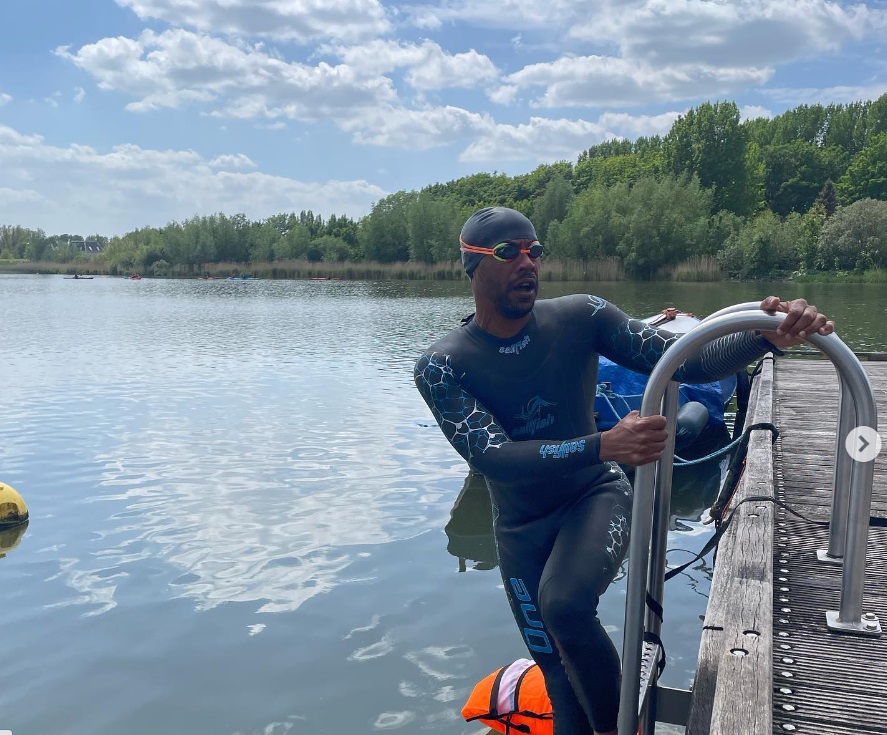


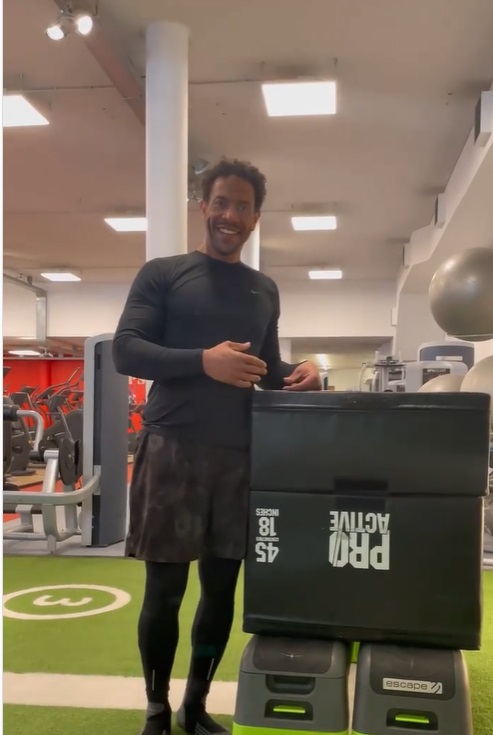
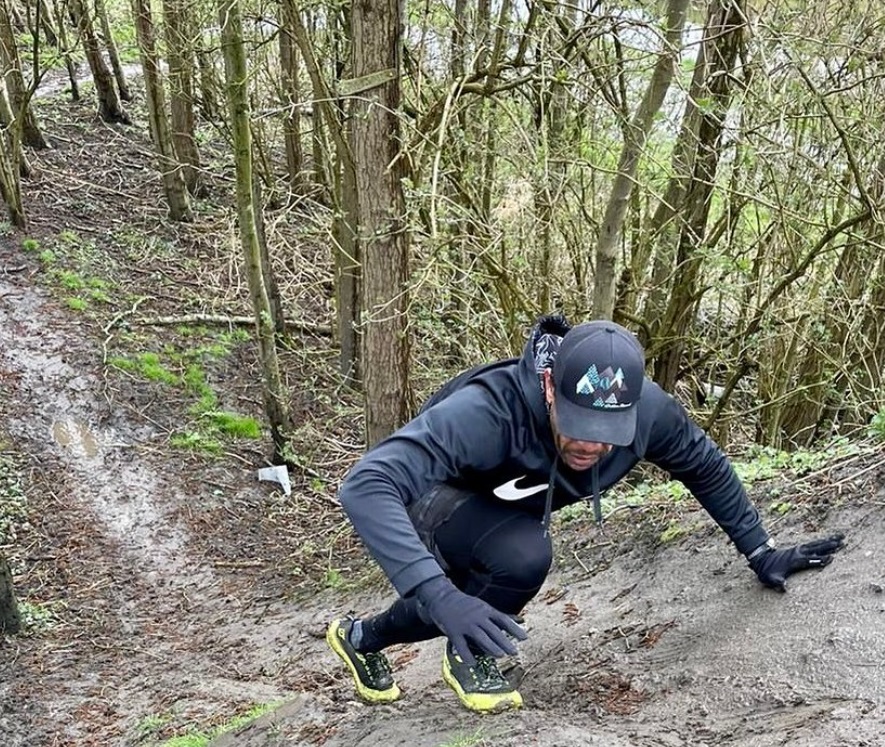

If you as Steven would meet a stranger on the bus (let say in New York or Bogota Columbia) and they would ask you to introduce yourself, what would you answer?
A man that can be driven to tears when he meets passionate people. And I love to connect people.
How would you describe Steven in one word or one sentence?
Very passionate. I am all in or go out.
Who are the persons that have inspired you the most in your career?
My parents as they didn’t project either their fears or their dreams onto me. Sigmar Djaoen taught me the discipline to stay the course whatever happens.
What is a trait that is still a work in progress?
Becoming more patient. Learn to manage the fact that my heart is bounded to Curaçao and Holland.
What was a defining moment in your life?
The first time that I got a failing grade for a subject matter that I have worked hard for when in Holland. The first time that I became a father. That gave me more satisfaction than money did.
What would you want your Loved Ones, family, friends, and others to say about you let’s say 20 years from now?
He was often absent and in his head. Now we understand why he was doing this. He has done for the greater good of all.
What makes you stay optimistic about the future of Curaçao and the world in general?
I have experienced the power of the mind because when the chips are down and we are in deep trouble, we are able to solve it and this I consider one of the greatest things of all, the limitless possibilities of our minds.
More info or connect
Platform: www.iseekme.com
Blogs: www.iseekme.com/author/delira
LinkedIn: linkedin.com/in/stevendelira
One of the 250 Influencers
Steven de Lira is a disciplined, determined, passionate, father, triathlon athlete, and entrepreneur. Having an Industrial and management background made him work early on in his career in both a super commercial environment in the Telecom sector and after this sector collapse, made him end up as an operational manager of a Social Workplace, which has also helped him develop his humanity. This has defined his personality, as he can navigate between both extremes and I can continuously be a connector of these extremes.
Using his strengths now as an entrepreneur made him become unafraid to make mistakes, work with mentors when others are better than him, see connections that others are unable to see as yet, like the ability to discern in data developments that most people don’t see, made him recognize the need to invest in social-emotional intelligence and to find out ways to scale up the spread of this competence.
Being raised in a safe and caring environment that allowed him to experiment and made him become an innovator in technology and in mindset changes. His BIG WHY to serve is in his DNA and an obligation of sorts which he happily works on. What makes Steven stand out is his focus on our youth and children. According to him, they are not only fun to be around them, but he knows that children have a big influence on their parents. They are also still full of dreams and longing to achieve something in their lives, whilst adults around their 30-ties don’t have any dreams.
That is why we need to keep inspiring children and feeding them to live up to their dreams. Let them cherish their dreams on a deeper level. Because of this, we consider Steven de Lira one of the 250 Influencers of Curaçao, representing the Educational Sector. Look at the list of the Influencers we have interviewed or reported on, up to now.
The goal of the core group of Share2Uplift for 2023
The goal of the Share2Uplift movement is to: “Identify 250 leaders from all walks of life to connect, align and create impactful changes in all walks of life, which includes intergenerational collaboration by the end of 2023.” We will use interviewing Influencers, meet-and-greet events, “train-the-trainers”-programs on “Emotional Mastery” and “Intentionality “as national intervention strategies, to reach this goal on top of our goal to scale up the possibilities to connect, align and create impact via a virtual platform. We believe that by collaborating with Miguel Goede on the virtual Vision 2030 platform, we will accelerate the possibilities to connect the diaspora and others elsewhere in the world and on the island willing to constructively create impactful changes in Curaçao, to join.
As Share2Uplift, we are fully trying to align with this thinking of Center for Curriculum Redesign to promote this agenda in our educational systems and workplace. So, in that sense, we fully support any initiative to make our educational system 21st-century proof.
Share2Uplift aligners are those that:
– Create an inspiring vision of the future;
– Motivate and inspire people to engage with that vision;
– Manage the delivery of the vision;
– Coach and build a team, so that it is more effective at achieving the vision. These criteria are now being polished.
We also consider these 5 values the most important ones for Share2Uplift aligners. They are:
• Peace from within;
• Compassion;
• Respectfulness;
• Integrity;
• Responsibility.
As we will progress towards this goal, we will update you on the progress.

Personal coaching tips
This week we will share some short videos on ‘Change’ as explained by Ben Tiggelaar. We will upload one of these videos every day on our facebook.com/share2uplift page.
De Ladder – Een praktijkvoorbeeld | Ben Tiggelaar – YouTube
De Ladder: een hele korte samenvatting | Ben Tiggelaar – YouTube
Wat maakt gedragsverandering zo moeilijk? | Ben Tiggelaar – YouTube
Veranderen? Houd het bij één doel | Ben Tiggelaar – YouTube
Dit zijn de drie ‘aanjagers’ van gedrag | Ben Tiggelaar – YouTube
Veranderen? Kies gedrag dat je leuk vindt | Ben Tiggelaar – YouTube
